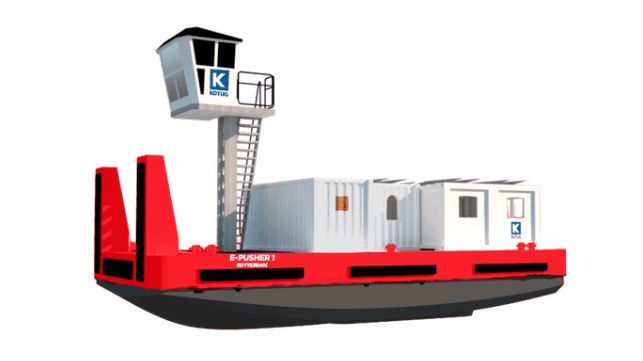Kotug Builds All-Electric Pusher Tug to Transport Cocoa for Cargill

Rotterdam-based tug operator Kotug is planning to use an all-electric pusher tug (towboat) to move barges of cocoa beans from the Port of Amsterdam to a mill operated by agribusiness giant Cargill. The project is an expansion on Kotug's existing electric pusher tug concept, which is already in service in a smaller format in the city of Leiden.
“We launched the E-Pusher concept in 2021, and the smaller type, the E-Pusher S (the CityBarge One), is already successfully deployed in several inland waterways and cities," said Ard-Jan Kooren, president and CEO of Kotug. "The applications of the E-Pusher are endless and vary from the transportation of construction waste to construction materials to all kinds of products and packages."
For the new contract with Cargill, Kotug will use one "medium-size" electric pusher tug and four barges to move cocoa beans between the Port of Amsterdam, the largest cocoa import port in the world, and a Cargill plant in Zaandam. Cargill will be the first company in the world with this fully electrified inland barging system.
Kotug's pusher tug is powered by swappable battery containers from Shift Clean Energy, which can be changed out when discharged. The medium-size version of the towboat can push barges with up to 4,000 tons of cargo. The company said that it has reduced the construction time by more than half compared to traditional pusher boats by using modular construction.
By using barges, Kotug expects that the E-Pusher concept will improve operational efficiency when compared to traditional European inland vessels. The swappable energy container will also assist: changing the container at one of the battery hubs is done in a few minutes, without waiting for charging. In addition, it means that empty batteries can be recharged at night, when there may be possible electricity surpluses on the grid.

that matters most
Get the latest maritime news delivered to your inbox daily.
“With our PwrSwäp charging stations along the route, as part of the broader Amsterdam-Rotterdam-Antwerp route, we can eliminate any concerns on range anxiety," said Paul Hughes, the president and co-founder of Shift. "In our opinion, overcoming this important hurdle will open the door to large-scale electrification of vessels, and thus to zero-emission water transportation."
The Netherlands is a hotbed of all-electric / green-fuel vessel development, and multiple prototypes for inland transport solutions are in development or operation today. Wärtsilä has launched another swappable-battery project at the nearby Port of Rotterdam, where its battery units are in use to power a small inland container vessel chartered to Heineken. It is planning to use similar battery containers for a self-navigating autonomous container barge within the Rotterdam port complex.
